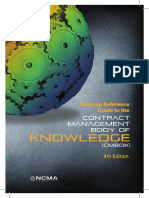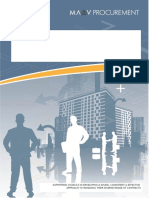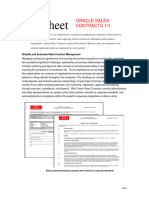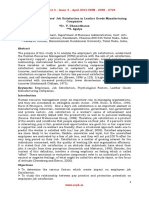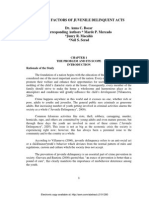Contract Managers Vs Project Managers
Contract Managers Vs Project Managers
Uploaded by
rony chidiacCopyright:
Available Formats
Contract Managers Vs Project Managers
Contract Managers Vs Project Managers
Uploaded by
rony chidiacOriginal Title
Copyright
Available Formats
Share this document
Did you find this document useful?
Is this content inappropriate?
Copyright:
Available Formats
Contract Managers Vs Project Managers
Contract Managers Vs Project Managers
Uploaded by
rony chidiacCopyright:
Available Formats
866.700.
7975 Contact Us Customer Login
Features Who We Help Pricing Blog Resources About Us Try It Free
Back to Blog
WELCOME
Contract Managers vs Project ContractWorks Blog
Managers An information hub for best practices in
contract management.
SUBSCRIBE FOR BLOG UPDATES
May 6, 2020 | By Elizabeth Cutright | Contract Management, Contract Management Best Practices
NAME
EMAIL*
SUBSCRIBE
Popular Posts
Contract managers and project managers are integral members of many business teams. Although
6 Key Clauses Found in Commercial
their roles and responsibilities are similar, and in some instances may even overlap slightly, these
are distinct positions requiring unique knowledge and skills. For simple contracts and projects, it is Contracts
often possible and economical to utilize one team. However, for more complex endeavors, it is
generally best to rely on separate teams with content-speci c expertise. Here are some key The Di erence Between Contract
di erences between contract managers and project managers. Management and Contract
Administration
Contract Managers
The Most Important KPI's for
Contract managers solely focus on the contracting process. For companies that regularly enter into
Contract Management
contracts with other rms and/or clients, it is imperative for the contracting cycle to be tightly
controlled. Incompetent negotiating, ill-written contracts, and/or lack of oversight can result in
6 KPIs to Measure the Performance
serious breaches, which often lead to costly contract disputes. An appropriately trained contract
management team will help ensure that contracting partners are properly vetted, the agreed upon of Your Contracts
contract terms are fair and bene cial to all parties, and the risks associated with any contracting
relationship are mitigated. 4 Goals of a Contract Management
Process and Signs of Success
About the Job
According to an International Association for Contract & Commercial Management (IACCM) survey,
contract managers typically report to either nance, legal, business operations, or sales and
marketing. This role works to ensure that each contract is properly monitored and all deliverables
are met according to the agreed upon terms. Contract managers are responsible for every phase
of the contract lifecycle after the contract has been drafted, negotiated, signed, and transitioned
from the contract administration team. For smaller companies without a dedicated contract
administrator, contract managers may have to take on additional responsibilities.
Expectations
Contract managers must be adept at research, risk analysis, and cost-bene t assessments. Keen
attention to detail and fastidious organizational skills are also vital. Contract managers often work
in conjunction with the legal and nancial teams of a company given the legal rami cations
inherent in the contracting process. As a result, they must have a strong understanding of the risks
of each prospective contract and the potential legal and nancial consequences associated
therewith.
Topics
It is expected that contract managers will keep track of all important details of an agreement,
including things like key deliverables and milestones, dates, deadlines, and opt-out/negotiation Agile Contract Management (9)
windows, and termination or cancellation requirements.
approvals (1)
Contract managers are also expected to understand the contract portfolio as a whole to identify
trends and implement processes improvements when needed. Part of this process is ongoing
contract reporting, and presenting key ndings to various stakeholders throughout the company.
Arti cial Intelligence (17)
Characteristics of a Good Contract Manager business contracts (1)
Managing contracts can be a challenging job, but having the right skillset can help succeed in the Compliance (36)
role. Here are some common characteristics of a strong contract manager.
contract amendments (1)
1. Time management
Contract Automation (14)
Appropriately managing contracts throughout their lifecycle takes time, so good contract managers
typically excel at time management and nd ways to optimize the contract management process
Contract Database (10)
for greater e ciency.
2. Risk management Contract Disputes (9)
Contract management and risk management are inherently tied together. Every time you enter Contract Drafting (27)
into a new contract you accept some level of risk, so understanding how to protect your
organization and reduce unnecessary risk as much as possible is critical. By keeping a close eye on Contract Lifecycle Management (21)
contract dates and deliverables, you can keep your team on track and help mitigate any potential
issues before they develop into signi cant problems.
Contract Management (180)
3. Understanding the compliance landscape
Contract Management Basics (8)
Similar to contracts and risk, contracts and compliance are also very closely related. In many cases,
staying on top of the terms laid out in contracts helps keep your company compliant with Contract Management Best
applicable laws and guidelines, which is why strong contract management is especially important in Practices (87)
regulated industries like healthcare, nance, and manufacturing.
Contract Management Service (4)
4. Attention to detail
Minor details can make or break an agreement. A good contract manager will have a keen eye for see more
detail, and can help identify any errors or typos in contracts that could lead to major problems if
not addressed early on. Contract managers often rely on contract management software to help
track the details of an agreement, and make sure no important deadlines are missed that could
cost the business.
5. Tech-savviness
Companies that have a large contract portfolio or are responsible for high-value or high-risk
contracts often turn to dedicated software for help managing these important agreements.
Because of this, it’s helpful for contract managers to have at least a basic understanding of how to
use the software solutions that allow you to successfully maintain your contracts and obligations.
Tips for Success
Whether you’re a brand new contract manager or have years of experience, everyone has room to
improve. Here are some tips for success in a contract manager role.
1. Develop the right professional strengths
The characteristics listed above are important for the job, but just because you don’t excel in all of
those areas right now doesn’t mean you can’t get there. Understand your professional strengths
and weaknesses and be willing to address any areas that might be holding you back.
2. Communicate and collaborate
Contract managers must be able to e ectively communicate with team members across the
organization to keep all relevant parties up to date with important contract information. Contract
managers should also be able to translate the complex legalese found in most agreements into
easy-to-understand language for colleagues outside of the legal department.
3. Become both a company and industry expert
The more you can learn about your company and the industry you work in, the better. Make a
point to learn as much as you can about your company’s leadership team, your customers and
vendors, the regulatory environment, the contract management performance metrics key
stakeholders care about most, and anything else that will give you a better understanding of how
the company operates.
4. Embrace technology
In virtually all contracts, time is of the essence, so contract managers generally rely upon purpose-
built contract management software to facilitate oversight of a company’s contract portfolio. A
robust contract management solution simpli es the tracking of important contract matters such as
critical deadlines, delivery schedules, and renewal or cancellation provisions. In addition, an online
contract database can serve as a secure, central repository. This streamlines collaboration among
the internal contract management team, and it facilitates communication with external parties as
well.
Project Managers
Project managers may be involved in the contracting process in some fashion, although that
usually is not their primary focus. Entering into a contract may be one part of a larger project, but
project managers are generally responsible for monitoring the progress of the project in its
entirety. For example, project managers often oversee the development of a good or product or
the launch of a speci c service or software. Thus, project managers may help source parts,
establish a budget, and create a timeline for the project completion. Throughout the life of the
project, project managers often play a crucial role in just about every facet of the process.
For this reason, project managers, like contract managers, must be highly detail-oriented, punctual,
and organized. Project managers often coordinate with contract managers with respect to any
contracts that are created in relation to a project, and thus they likely access the same contract
management software. Of course, given the breadth of their responsibilities, project managers no
doubt utilize other technology as well, such as a virtual data room (VDR) to safely store and share
project data and customer relationship management software (CRM) to monitor customer
interactions.
About the Job
Project managers play an important role within any company, working closely with teams across
the organization to ensure projects are successfully completed from start to nish. Project
managers are responsible for keeping projects on track according to the timelines, budgets, and
goals established at the beginning of the initiative. Ultimately, a project succeeds or fails based on
the project manager’s ability to allocate resources, solve unexpected problems, communicate with
stakeholders, and hold all team members accountable for their speci c pieces of the project.
Expectations
Project managers are expected to facilitate the successful execution of new projects within the
scope outlined by key stakeholders, which often includes company leadership and senior members
of the project team. The project manager serves as the primary point of contact for team members
throughout all stages of the project, and is expected to know the status and progress of each
individual task, deliverable, and milestone. If any problems arise during the course of the project,
the project manager is expected to nd an appropriate solution that will get the team back on
track.
Characteristics of a Good Project Manager
Here are some of the characteristics of a good project manager.
1. Leadership
Leadership and project management typically go hand-in-hand. Since project managers rely on
many other teammates to successfully complete the project, it’s imperative that you understand
how to motivate your colleagues and get buy-in so everyone is committed to accomplishing the
goals according to plan.
2. Communication
E ective communication is one of the most important characteristics of a good project manager, as
your ability to clearly convey expectations, timelines, and goals can shape how the project plays
out. You also need to be able to communicate updates to stakeholders so everyone involved
understands exactly where the project stands along the way.
3. Problem solving
Every project manager will have to problem solve at some point during just about every project
you’re involved with. If you can plan ahead and take into consideration the possibility that things
won’t go exactly as planned, you’ll be in a better position to react when those problems inevitably
arise. How you respond to bumps in the road is a strong indicator of how the project will turn out.
4. Task management
Good project managers work with various team members to understand the tasks each person is
responsible for so they can provide adequate support and establish realistic timelines. It’s
important to regularly check in with each person involved so you know that individual tasks are on
track and that there aren’t any roadblocks that could lead to costly delays.
5. Organization
Because there are so many moving parts to a project, strong organizational skills are a must for
any project manager. Projects that aren’t extremely well-organized are more likely to experience
delays, cost overruns, team member confusion, and other issues that can derail the project. Just
like contract managers often adopt software to help keep track of important details, project
managers also invest in dedicated software to help stay on track and in control.
Tips for Success
Becoming a good project manager takes work. Here are some tips to help you succeed.
1. Build relationships with colleagues
As mentioned, project managers rely on every member of the team to contribute and do what they
say they are going to do in order for the project to succeed. Building strong relationships, and
celebrating individual and team victories, will help the group function better together and feel a
sense of commitment to you as the project manager, each other, and the project itself.
2. Fill in knowledge or skill gaps
Similar to contract managers, it’s ok if you aren’t as strong as you’d like to be in every skill needed
to be an excellent project manager. If there are certain areas of the job - or a speci c project - that
you aren’t con dent about, put in the time and e ort to learn and improve in the relevant areas.
3. Ask questions
Communication often breaks down because of confusion or a lack of clarity. If there are any points
during the project where you aren’t one hundred percent clear you understand something, ask
questions. Moving forward without being on the same page as your teammates can lead to
avoidable issues.
4. Keep detailed notes
As project manager, you’re likely going to have dozens of meetings, both as a group and with
individual team members, throughout the life of the project. Part of your job is to document every
update, question, and concern along the way, so make sure you keep detailed notes of every
discussion you have pertaining to the project.
Contract managers and project managers share many of the same responsibilities and challenges,
but ultimately have di erent roles and functions within an organization. While project managers
are responsible for working with cross-functional teams to closely manage new initiatives from
start to nish, contract managers are responsible for keeping track of every deadline, deliverable,
and other obligations laid out in a company’s contracts.
ContractWorks Contract Management Software helps contract managers store, organize, monitor,
and report on your corporate agreements in less time using fewer resources. Schedule a demo to
learn more about how ContractWorks can improve your contract management process.
Read The Previous Post Read The Next Post
Newsroom STAY CONNECTED
Careers Get email updates from our blog. EMAIL* SUBSCRIBE
Partner Programs
© 2020 SecureDocs, Inc. Terms of Service Privacy Policy Help
You might also like
- Contract Management PlaybookDocument35 pagesContract Management PlaybookCreanga GeorgianNo ratings yet
- Conservation Contributions 16Document208 pagesConservation Contributions 16Kary ChanNo ratings yet
- Knowledge Assessment Self Review Form Ka02Document43 pagesKnowledge Assessment Self Review Form Ka02Ken So100% (2)
- Complete Guide To Contract Lifecycle Management PDFDocument38 pagesComplete Guide To Contract Lifecycle Management PDFtek_surinder100% (1)
- Tricks of The Trade - PM Role With ContractsDocument2 pagesTricks of The Trade - PM Role With ContractsxavimNo ratings yet
- Cmbok Desktop Pocket GuideDocument36 pagesCmbok Desktop Pocket Guidemario568175% (4)
- L6M5 Tutor Notes 1.0 AUG19Document22 pagesL6M5 Tutor Notes 1.0 AUG19Timothy Manyungwa IsraelNo ratings yet
- Contract Management GuidelinesDocument37 pagesContract Management GuidelinesWilliam Andrew Gutiera Bulaqueña100% (2)
- Contract Management GuidelinesDocument37 pagesContract Management Guidelinesarvinddhotre3131100% (4)
- The Contract Management StandardDocument10 pagesThe Contract Management StandardAdil IqbalNo ratings yet
- Ultimate Guide To Contract Management ApttusDocument26 pagesUltimate Guide To Contract Management Apttusdebananda panda100% (2)
- Contract Management GuidelinesDocument37 pagesContract Management GuidelinesAnoopSankar100% (7)
- Project Report-Commercial and Contract ManagementDocument11 pagesProject Report-Commercial and Contract Managementsanjeev raoNo ratings yet
- A Way To Successful Contract ManangementDocument6 pagesA Way To Successful Contract Manangementtsar_philip2010No ratings yet
- Understanding The IACCM CCM Learning & Certification ProgramsDocument13 pagesUnderstanding The IACCM CCM Learning & Certification ProgramsAnjali VermaNo ratings yet
- Contract Leadership Handout CIPS2Document6 pagesContract Leadership Handout CIPS2Tan-Uy Jefferson JayNo ratings yet
- Leadership & TeamworkDocument5 pagesLeadership & TeamworkAvisekNo ratings yet
- Contract Management SampleDocument23 pagesContract Management SampleAristideNo ratings yet
- Contract Administration: Construction Management Jumpstart Second Edition Barbara J. JacksonDocument49 pagesContract Administration: Construction Management Jumpstart Second Edition Barbara J. JacksonAngelli Juelar Naigan100% (1)
- NEC 4 Rocurement Forms of FM Contract 2018Document29 pagesNEC 4 Rocurement Forms of FM Contract 2018Jose Antonio FigueroaNo ratings yet
- Ultimate Guide To Contract ManagementDocument22 pagesUltimate Guide To Contract ManagementJohnNo ratings yet
- Contract Manager: A New Project Team Member?Document7 pagesContract Manager: A New Project Team Member?Roqaia AlwanNo ratings yet
- Contract Administration in Project Management - ConceptsDocument5 pagesContract Administration in Project Management - ConceptsMohamed SaheelNo ratings yet
- 12 Best Practices in Contract MGTDocument36 pages12 Best Practices in Contract MGTDaniel LongweNo ratings yet
- Contract Administration Workbook Virtual - 4 HrsDocument55 pagesContract Administration Workbook Virtual - 4 Hrslassem2281No ratings yet
- Claim E Solutions Expert ServicesDocument15 pagesClaim E Solutions Expert ServicesArindam HaldarNo ratings yet
- Oracle Contract Management: Know More. Do More. Spend LessDocument28 pagesOracle Contract Management: Know More. Do More. Spend LessMohammad Younus Anwar Qureshi100% (1)
- Principle of Eng'g ManagementDocument27 pagesPrinciple of Eng'g ManagementJohn Francis PedrosoNo ratings yet
- Contract Strategy, Concept, Choices and MethodologyDocument34 pagesContract Strategy, Concept, Choices and MethodologyShiva KhanalNo ratings yet
- Chapter Eight Contract Management and ProcurementDocument87 pagesChapter Eight Contract Management and ProcurementCaroline TaluNo ratings yet
- PD - 2.0 - Senior Contracts AdministratorDocument3 pagesPD - 2.0 - Senior Contracts Administratornasir aliNo ratings yet
- Contract ManagementDocument3 pagesContract ManagementSaad IrfanNo ratings yet
- Contract Management Professional Standards v2Document39 pagesContract Management Professional Standards v2Shyamala GouthamNo ratings yet
- CZJZMZMKM377Document31 pagesCZJZMZMKM377singhaniaranjan1909No ratings yet
- Contract TypesDocument5 pagesContract TypesaliNo ratings yet
- How To Use A Partnering Approach For Construction ProjectDocument34 pagesHow To Use A Partnering Approach For Construction ProjectMdms PayoeNo ratings yet
- WorldCC CCM CertificationDocument14 pagesWorldCC CCM CertificationSathish Kumar SakthivelNo ratings yet
- The Master Checklist For Contract Review and ManagementDocument7 pagesThe Master Checklist For Contract Review and ManagementHanh PNo ratings yet
- Contract Management Standard 1689121736Document10 pagesContract Management Standard 1689121736R.A. AbriantoNo ratings yet
- Safari - Mar 13, 2018 at 10:54 PMDocument1 pageSafari - Mar 13, 2018 at 10:54 PMthan zawNo ratings yet
- Resume Sudhan Contract Manager 2023Document1 pageResume Sudhan Contract Manager 2023premkumar.bathalaNo ratings yet
- Contract Administration Workbook VirtualDocument54 pagesContract Administration Workbook Virtuallassem2281No ratings yet
- Introto Contract ManagementDocument23 pagesIntroto Contract ManagementAdnan AhmedNo ratings yet
- Best Practice Guide Contract ManagementDocument68 pagesBest Practice Guide Contract ManagementMohammed HussainNo ratings yet
- David PPT THESISDocument27 pagesDavid PPT THESISMugaad DavidNo ratings yet
- Contract ManagementDocument9 pagesContract ManagementYashas JaiswalNo ratings yet
- Project Implementation: Unit IVDocument9 pagesProject Implementation: Unit IVvishal srivastavaNo ratings yet
- Cna Hp15!5!060315 CF Prod Job DescDocument2 pagesCna Hp15!5!060315 CF Prod Job DescSergioNo ratings yet
- 03 08 14 - M02 Contract - EnglDocument12 pages03 08 14 - M02 Contract - EnglISQNo ratings yet
- National Treasury FrameworkGuide SummaryDocument7 pagesNational Treasury FrameworkGuide SummaryANTONIO CAMILONo ratings yet
- SAP Sourcing - CLM Webcast - Contract Management Best PracticesDocument28 pagesSAP Sourcing - CLM Webcast - Contract Management Best Practiceswq3erwqerwerNo ratings yet
- Contract Management GuidelinesDocument37 pagesContract Management Guidelinesanil100% (1)
- Procurement Article ReviewDocument5 pagesProcurement Article ReviewAbdisen Tefera50% (4)
- Collaborative Contracting Moving From Pilot To Scale Up PDFDocument8 pagesCollaborative Contracting Moving From Pilot To Scale Up PDFavinish007No ratings yet
- Points of Value of The Construction Management MethodDocument7 pagesPoints of Value of The Construction Management MethodHard SmokerNo ratings yet
- 11i10 Sales Contracts DsDocument6 pages11i10 Sales Contracts DsandrysuryadNo ratings yet
- Involvement of SubContrctsDocument24 pagesInvolvement of SubContrctsAnders LaursenNo ratings yet
- Contract ManagerDocument2 pagesContract Managerdineshkmr373No ratings yet
- Chapter4-Contract ManagementDocument15 pagesChapter4-Contract ManagementRahul RajaNo ratings yet
- PMP Chapter-12 P. Procurement ManagementDocument30 pagesPMP Chapter-12 P. Procurement Managementashkar299No ratings yet
- IEC 61400 - WikipediaDocument5 pagesIEC 61400 - Wikipediarony chidiacNo ratings yet
- Oligarchy - Definition & Facts - BritannicaDocument1 pageOligarchy - Definition & Facts - Britannicarony chidiacNo ratings yet
- Confederation Vs Federation - Difference and Comparison - DiffenDocument1 pageConfederation Vs Federation - Difference and Comparison - Diffenrony chidiacNo ratings yet
- Bees Love Cannabis and It Could Help Restore Bee PopulationsDocument1 pageBees Love Cannabis and It Could Help Restore Bee Populationsrony chidiacNo ratings yet
- Hash Rate - Binance AcademyDocument1 pageHash Rate - Binance Academyrony chidiacNo ratings yet
- Tarek Makhoul CV 2018-1Document4 pagesTarek Makhoul CV 2018-1rony chidiacNo ratings yet
- Lebanese Entrepreneur Jean Nehmé Sold His Startup For USD 500 MillionDocument1 pageLebanese Entrepreneur Jean Nehmé Sold His Startup For USD 500 Millionrony chidiacNo ratings yet
- Graham Number DefinitionDocument1 pageGraham Number Definitionrony chidiacNo ratings yet
- Budding Creators: Q/buddingcreatorsDocument1 pageBudding Creators: Q/buddingcreatorsrony chidiacNo ratings yet
- File - Oil and Gas Industry Reserves by Nation - PNG - Wikimedia CommonsDocument1 pageFile - Oil and Gas Industry Reserves by Nation - PNG - Wikimedia Commonsrony chidiacNo ratings yet
- One-Year Master's Courses - Non-EU Citizens Living Outside Italy - International - Unitn.itDocument1 pageOne-Year Master's Courses - Non-EU Citizens Living Outside Italy - International - Unitn.itrony chidiacNo ratings yet
- Advanced Master in Maritime Engineering - Transport, Energy, Sustainable Development - ENSTA Paris, Grande École D'ingénieurs GénéralisteDocument1 pageAdvanced Master in Maritime Engineering - Transport, Energy, Sustainable Development - ENSTA Paris, Grande École D'ingénieurs Généralisterony chidiacNo ratings yet
- Top Free Sites To Download Books - Google SearchDocument1 pageTop Free Sites To Download Books - Google Searchrony chidiacNo ratings yet
- Hawking - Google SearchDocument1 pageHawking - Google Searchrony chidiacNo ratings yet
- Smart Cities Yncrea Hei PosterDocument3 pagesSmart Cities Yncrea Hei Posterrony chidiacNo ratings yet
- Job Discription SampleDocument10 pagesJob Discription SampleNandita Asthana SankerNo ratings yet
- Old But GoldDocument20 pagesOld But GoldDUONGNo ratings yet
- Abdul Salam Project Report SafexpressDocument51 pagesAbdul Salam Project Report SafexpressAbdul Salam ASNo ratings yet
- Is.3233.1965 - Glossary of Terms For Safety and Relief ValvesDocument33 pagesIs.3233.1965 - Glossary of Terms For Safety and Relief Valvestvmehta01No ratings yet
- Hicks S J and Sales B D 2006 Criminal PRDocument2 pagesHicks S J and Sales B D 2006 Criminal PRkhalid becharNo ratings yet
- Pre-Assessment Weather Pre-KDocument5 pagesPre-Assessment Weather Pre-Kapi-351764706No ratings yet
- Assessment and Evaluation 2024Document24 pagesAssessment and Evaluation 2024trevlynrobinsNo ratings yet
- Hypothesis Testing #3: ENME392 Statistical Methods For Product and Processes DevelopmentDocument18 pagesHypothesis Testing #3: ENME392 Statistical Methods For Product and Processes DevelopmentZain BaqarNo ratings yet
- Slides HR PlanningDocument25 pagesSlides HR Planningshiv_098100% (1)
- Brand Hate Thesis FFFDocument101 pagesBrand Hate Thesis FFFAmbreen ZahraNo ratings yet
- Chap 1 and 2 Presentation ENTREPDocument16 pagesChap 1 and 2 Presentation ENTREPShan Polo VeraNo ratings yet
- Sentiment Analysis On Transcript Calls 2Document43 pagesSentiment Analysis On Transcript Calls 2Saurabh SharmaNo ratings yet
- School of Graduate Studies: Republic of The Philippines Sorsogon State College Sorsogon CityDocument5 pagesSchool of Graduate Studies: Republic of The Philippines Sorsogon State College Sorsogon Citymj piersonNo ratings yet
- Recommender Systems in Fashion and Retail: Humberto Jesús Corona Pampín Reza Shirvany EditorsDocument125 pagesRecommender Systems in Fashion and Retail: Humberto Jesús Corona Pampín Reza Shirvany Editorsthanh phamNo ratings yet
- A Study On Employees' Job Satisfaction in Leather Goods Manufacturing CompaniesDocument12 pagesA Study On Employees' Job Satisfaction in Leather Goods Manufacturing Companiesarcherselevators100% (1)
- Performance Management System of A Security Agency in The PhilippinesDocument8 pagesPerformance Management System of A Security Agency in The PhilippinesAina HaravataNo ratings yet
- This Content Downloaded From 103.229.203.198 On Wed, 13 Apr 2022 07:01:02 UTCDocument7 pagesThis Content Downloaded From 103.229.203.198 On Wed, 13 Apr 2022 07:01:02 UTCDewi Utami IrianiNo ratings yet
- Juvenile DelinquencyDocument20 pagesJuvenile DelinquencyJennica Torres100% (2)
- Unit Teaching Summary EarthDocument2 pagesUnit Teaching Summary Earthapi-323069431No ratings yet
- Case Study ResearchDocument20 pagesCase Study ResearchManish PuttyahNo ratings yet
- 2014 2015 Annual Report AustraliaDocument44 pages2014 2015 Annual Report AustraliafalsflorinNo ratings yet
- Daniiiiiii TGSDocument2 pagesDaniiiiiii TGSEgi NurdiansyahNo ratings yet
- Urbanization and World City Formation in China: Shanghai's Shifting Position in National and Global Networks of CitiesDocument71 pagesUrbanization and World City Formation in China: Shanghai's Shifting Position in National and Global Networks of Citiesjoar sorianoNo ratings yet
- 2.2 - Managerial Research Methods: Module 1 - Introduction To Management ResearchDocument89 pages2.2 - Managerial Research Methods: Module 1 - Introduction To Management ResearchshaziafirdoosNo ratings yet
- Answer All Parts of The Question Below:: PSYC1022 Psychology of AddictionDocument3 pagesAnswer All Parts of The Question Below:: PSYC1022 Psychology of AddictionMakena Rose KlaningNo ratings yet
- Test Bank For Sexuality Today 11th Edition by KellyDocument12 pagesTest Bank For Sexuality Today 11th Edition by Kellya629845278100% (1)





